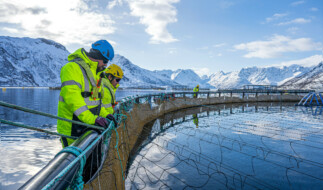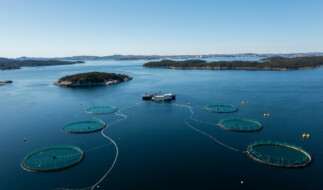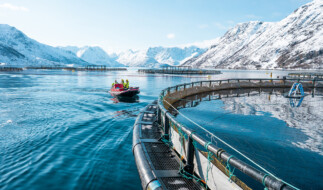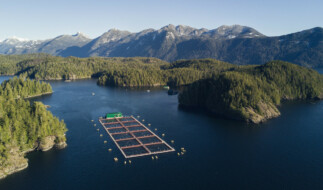Transparency at the Heart of Our Supply Chains: Learnings from GreenBiz 20
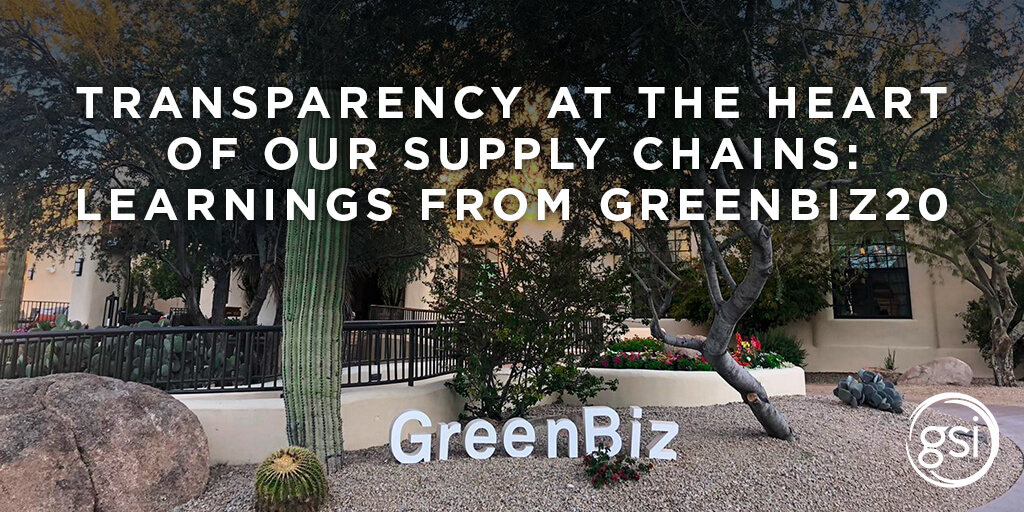
On February 4–6, 2020, the Global Salmon Initiative (GSI) was invited to GreenBiz 20 – “the premier annual event for sustainable business leaders”. Our GSI CEO, Sophie Ryan, joined global leaders from across multiple sectors to discuss how to improve the transparency of supply chains, taking part in a half-day working session focusing on how to incentivize organizations and supply chains, including farmed fish, to become more transparent.
In this blog, we discuss the importance of transparency and traceability in the seafood and fish farming sectors, some examples of the efforts conducted in the farmed salmon industry, and some of the learnings from the session that can be transferred.
“To be climate-resilient and sustainable, our food systems need to change… working with the whole supply chain is the only way to achieve this.”
The need for transparency
In a world in which knowledge is power, transparency within the supply chain has become more important than ever. Across all industries, there is a demand to know more about where things have come from and how they are produced, and importantly, there is a willingness to pay more for this transparency and traceability.
Researchers at the MIT Sloan School of Management found that consumers may be willing to pay 2%–10% more for products from companies that provide greater supply chain transparency.
One industry that is facing these pressures more than ever is the food industry. As consumers, we want to know more about the food we are eating, and look to retailers to provide us with high-quality, safe produce that has been sourced responsibly.
In recent years, there have been a number of situations in the seafood industry specifically (the uncovering of extensive slavery used in the fisheries sector in Asia, and even the mislabeling of seafood in Canada) that have made it even more important that, as a sector, there is an enforced transparency at a base level, and ideally, a drive to go beyond that to ensure full traceability across the supply chain.
But how easy is it to implement transparency across a multi-stage supply chain? And how can it be done and benefit the farmed salmon sector?
Implementing industry transparency
There are different levels of transparency and different approaches that can be taken, but within GSI our members have made a commitment to greater transparency and have adopted two approaches to do so:
In 2013, we launched the GSI Sustainability Report. Via this online, public report, all GSI members must report annually against 14 key sustainability indicators, including fish escapes, medicine use, as well as feed efficiency and social impact, for all their operations. In 2015, it was stipulated that all data received would be independently audited to ensure full accountability and credible information. By creating this report, it provided a platform to ensure all our members are being transparent on their performance.
In addition, as members of GSI, all companies are committed to working towards achieving 100% ASC certification across their farms. This process means that salmon farms, once certified, have been independently verified as operating at the highest levels of environmental and social performance. As part of the ASC certification process, farms are audited against 152 criteria, and these data are uploaded and accessible via the ASC website. For consumers, seeing and choosing ASC-certified farmed salmon means they can be assured that the product has been produced responsibly, and that its journey to them as been reviewed and assessed.
In addition to the work within the GSI, many of our members are also looking at implementing further steps to improve traceability along their supply chains:
Blockchain technology
Blockchain technology allows retailers and consumers to track a product from its source to their plate, providing information such as where it was farmed, by whom, what it was fed, where it was processed and how long it traveled to the store, all from their phone. The introduction of blockchain into the food industry will revolutionize the level of traceability within the sector, and the farmed salmon sector is one of the leading sectors to develop this technology.
You can learn more on how the process works in GSI member Mowi’s video here:
Partnerships supporting greater transparency:
SeaBOS: Much like the GSI, the Seafood Business for Ocean Stewardship (SeaBOS) is an initiative resulting from conversations between scientists and seafood companies with the aim to improve transparency and traceability across the global seafood industry. Connecting fisheries, aquaculture, retailers and scientists, the group aims to improve access to sustainable seafood and improve industry traceability, and has recently signed a partnership with the Global Dialogue on Seafood Traceability to introduce standards that will improve the quality, efficiency and affordability of seafood traceability. GSI members and associate members Mowi, Cermaq, Cargill, and Skretting are involved in this dialogue, and are sharing their experience and expertise to promote the importance of traceability and ensure it is at the foundation of this growing sector.
Rabobank, WWF Chile, and Chilean salmon producers work together towards a more sustainable salmon farming industry: Transparency provides an effective way of building partnerships. In April, 2012, Rabobank, WWF Chile, and a number of Chilean GSI companies entered into an alliance to demonstrate that conserving natural resources, protecting ecosystems and working with local communities can go hand in hand with economic returns. This is an ongoing project with the aim of improving progress by joining forces; by the salmon farmers being transparent on their operations, they have been able to form supportive and effective partnerships.
Click to read more about the alliance.
Although the salmon farming and fish farming industries are making great strides in terms of traceability, there is still a long way to go.
What learnings can we take from the GreenBiz Supply Chain Transparency Summit?
We know that companies want to be seen as more sustainable, but what about transparency? As part of the session at GreenBiz 20 we discussed some incentives that may encourage organizations, and their supply chains, to be more transparent. As well as the reputational implications and building of trust that we’ve already discussed, supply chain transparency has also been shown to influence:
- Access to financing
- Economies and cost efficiencies
- Higher chance of partnerships
- Option to access credits for efficient practices (eg. soil/carbon)
And while it may seem obvious to many, another key learning that may support the successful movement towards greater transparency is to communicate this shift, both internally and externally.
- It was highlighted in the session to remember to think about communications from the angle of the audience:
- Internally – what will change, how it will impact their job function, and likely impacts (both positive and negative)
- Externally – how improved transparency will improve food safety
- Create a story around the production process, and pay particular attention to any indigenous communities that are involved in the supply chain
- Utilize third-party organizations to benchmark transparency – for example, sustainability consortium
Moving towards greater transparency is not always easy, and can be daunting. But by ensuring the move is done in the right way, and by bringing the relevant stakeholders along with you, it can bring many benefits.
Investing in improved transparency throughout the supply chain is a win-win; it can reduce reputational risk and enhance an organization’s profile as trustworthy and responsible, forms ethical and responsible working environments, and provides consumers with the reassurance they are purchasing food produced to the highest environmental and social standards. The demand for increased transparency is here to stay, and GSI members are committed to being at the forefront of developments in traceability and in creating a culture of continuous improvement within the organization and across value chains.
